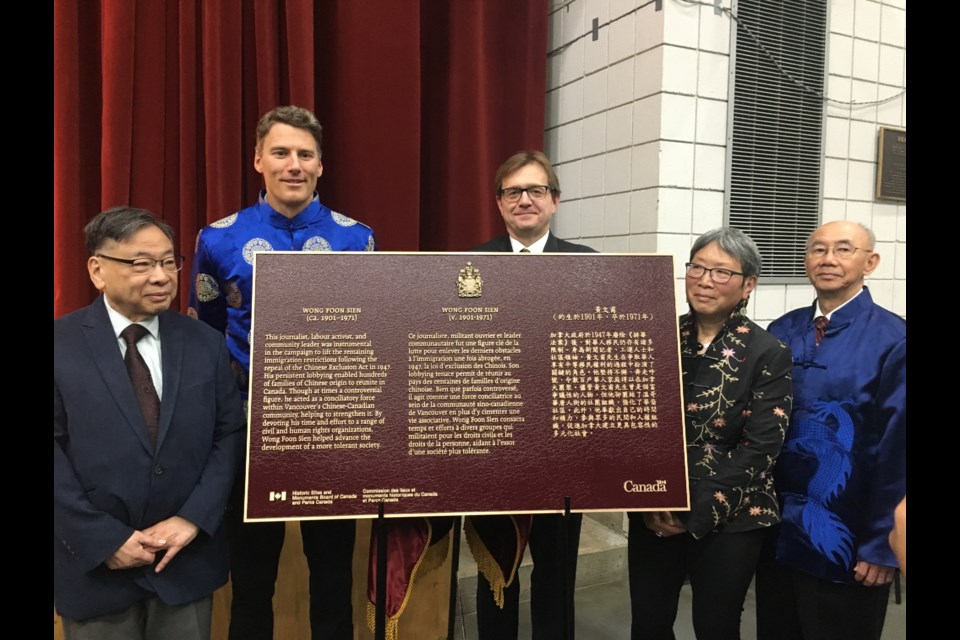Ling Yang stands in the corner of her store as she carefully puts small beads on a piece of thread. She looks up and smiles whenever customers enter, sometimes offering them a little nod and a timid greeting.
Last year, Yang took over Chinese Zodiac Gifts and Souvenirs, a 13-year-old establishment in Vancouver’s Chinatown and on a gloomy Saturday such as this, she busies herself making bracelets and listening to soft traditional Chinese music.
“I like this store…. I want to keep it for the future because it’s a very traditional Chinese style,” Yang says as she points out the store’s proximity to Dr. Sun Yat-Sen Classical Chinese Garden. “I want to keep Chinese traditional things forever and it’s a good thing for visitors.”
Yang’s not the only one who wants to keep Vancouver’s Chinese history and traditions alive.
In the Chinese Cultural Centre next door, people gathered May 13 to celebrate the unveiling of plaques that honour the national historic significance of Vancouver’s Chinatown, as well as Wong Foon Sien and Nellie Yip Quong, two key figures who helped shaped not only Chinatown, but also the lives of Chinese-Canadian immigrants.
Remembering and celebrating people and history
Established in 1880, Vancouver’s Chinatown is one of the oldest and largest in Canada. Parks Canada, which spearheads the national plaque program, says Chinatown’s development as a self-segregated enclave was due in part to racially motivated hostility elsewhere in the city prior to the Second World War.
Chinatown became a distinct and self-contained neighbourhood that grew with the city. By 1921, Chinatown’s population rose to 6,484. However, following the Chinese Immigration Act in 1923, the neighbourhood went into a period of stagnation and the effects were disastrous to the Chinese community.
Also known as the Chinese Exclusion Act, it was the only law specifically aimed at a particular group of people. The legislation shut the door to any migration from China with the exception of students, ministers and diplomats.
Wong Foon SienĚýwas born in China in 1901, and later immigrated to Cumberland, B.C. with his family. His father became a successful merchant and Foon Sien embarked on a career as a professional cultural broker.
For almost half a century, Foon Sien fought for the civil and human rights of Chinese-Canadians. He was a leading figure in the campaign for less restrictive immigration policies and a vital contributor towards the reunification of Chinese families in Canada.
Throughout his life, he played numerous roles from union leader to journalist. He was also known as the “unofficial Mayor of Chinatown” and the “Champion of Chinese Rights.” He gained respect as a leader and, when he died in 1971, his funeral was one of the largest seen in Chinatown.
Nellie Yip Quong,Ěýa Caucasian woman who mastered five Chinese dialects, achieved acceptance, respect and admiration within the Chinese community.
Known as “Granny Yip,” Quong was born Nellie Towers in Saint John, New Brunswick. She was and English teacher in New York City when she met Â鶹´«Ă˝Ół»jeweler Charles Yip Quong — a widower with a seven-year son — and married him in 1900. Theirs was one of the rare and early, yet successful, interracial marriages. But, this came at a cost to Nellie. She lost touch with her family and the Roman Catholic Church when neither recognized her marriage.
Quong served as a midwife for some 500 Chinese-Canadian women and also dedicated her time as interpreter, adoption broker and foster mother within the Chinese-Canadian community.
Because of their dedication, both Foon Sien and Quong became well-loved legends in the Chinese community.
Chinatown, today
In her store, Yang reflects on the decline of visitors and customers.
“People are afraid to come to Chinatown. I know some Chinese people don’t like to go to Chinatown because of homeless people, they are afraid of them. I don’t know why. I don’t think they are very dangerous people, but people who come here rarely, they think they are very dangerous or bad people,” she said.
However, last year her windows were broken three times, the first vandalism in 13 years. Every morning she has to clean up waste — human and otherwise. “For me it’s not good, most owners are not comfortable here,” she said.
But, Yang remains hopeful in the midst of changes and uncertainty. She smiles and says, “It’s a very nice store. I want to keep it forever, but I don’t know.”
Ěý
Ěý



